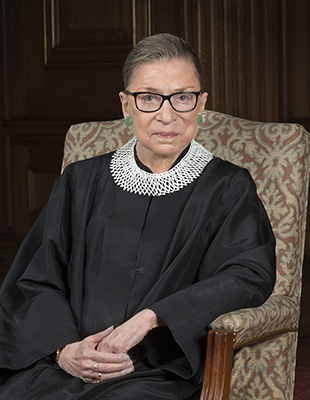Be a Catalyst for Change Like Justice Ginsburg
Fight for the things that you care about, but do it in a way that will lead others to join you.
U.S. Supreme Court Justice Ruth Bader Ginsburg was known for being a fighter—for women’s rights and equality, social justice, and even her own health, battling five bouts (https://www.npr.org/2020/09/18/100306972/justice-ruth-bader-ginsburg-champion-of-gender-equality-dies-at-87) of cancer diagnoses. On Friday, September 18, 2020, the 87-year-old passed away from metastatic pancreatic cancer.

Serving on the Supreme Court since her appointment in 1993, Ginsburg left a legacy of opinions, dissents, and rulings that demonstrated her fervor for the 14th amendment, which guarantees (https://constitutioncenter.org/interactive-constitution/amendment/amendment-xiv) all U.S. citizens equal protection of the laws, regardless of gender, race or ethnicity, socioeconomic status, education, or other factors related to disparities. Her commitment to the cause was evident in that she never let any of her health scares keep her from serving. Her supporters looked on, admiringly, as the media regularly reported her continued work from her hospital bed, even as recently as July (https://www.npr.org/2020/07/14/891173641/ruth-bader-ginsburg-hospitalized-again).
"Real Change, Enduring Change, Happens One Step at a Time."
Thanks to Ginsburg, women’s rights have come a long way since the 1970s when she first began her crusade. And perhaps that’s because of her patience and perseverance, recognizing that social revolution is measured by incremental changes.
Oncology nurses have similar observations in practicing evidence-based cancer care. Defining the gaps, identifying solutions, studying and testing the methods, reporting the results, and implementing change is a stepwise process, but if followed through with patience and perseverance, it makes a real difference in cancer outcomes. Like Ginsburg, oncology nurses are a catalyst for incremental change, whether it’s at the benchside, bedside, classroom, or even the halls (https://voice.ons.org/advocacy/two-ons-health-policy-priorities-pass-the-house-thanks-to-2019-capitol-hill-days) of the U.S. Congress.
Regardless of political leanings, Ginsburg was a role model as a leader and fighter who many oncology nurses can relate to. 2020 marks a lot of milestones, and one of them is the anniversary of women’s suffrage and ratification of the 19th amendment giving women (https://constitutioncenter.org/interactive-constitution/amendment/amendment-xix) the right to vote. Ginsburg’s life changed America, and her death may too: Honor the type of passion and leadership she represented by voting this November.
Learn more about how you can get involved in making real change on the ONS Center for Advocacy and Health Policy (https://www.ons.org/make-difference/ons-center-advocacy-and-health-policy?ref=RO).
